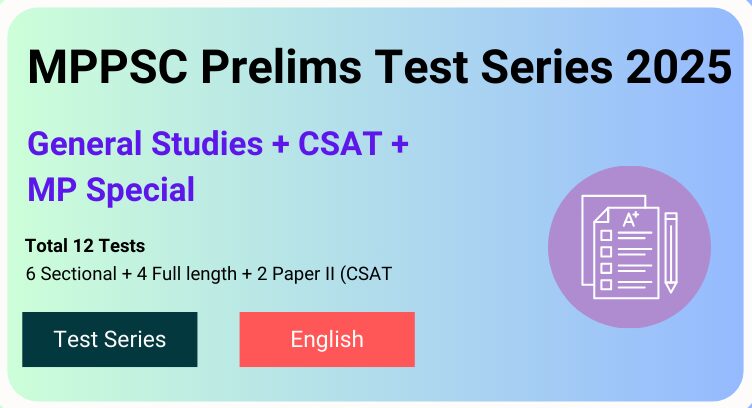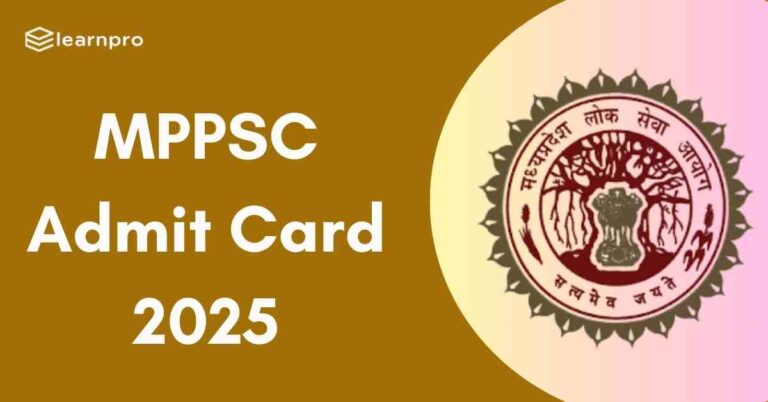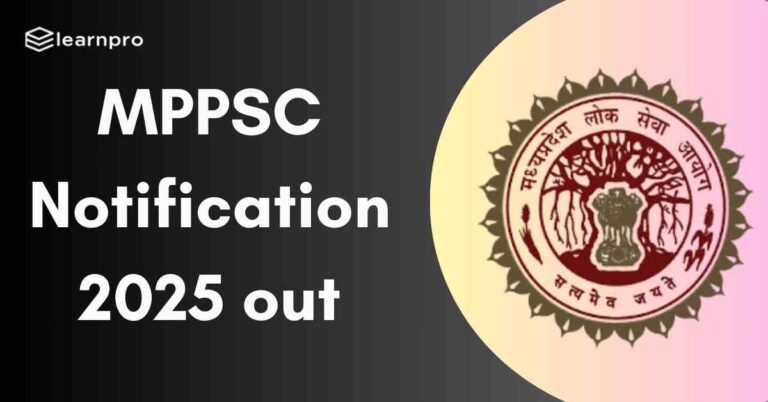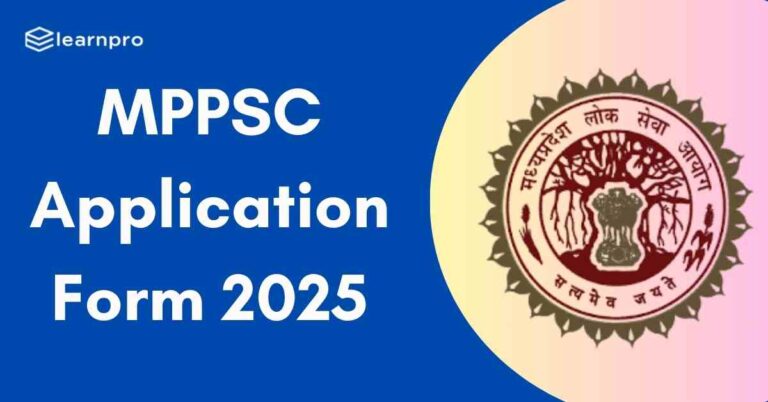December 9, 2025 12:30 am
Are you gearing up for the MPPSC 2025 exam and searching for a detailed understanding of the MPPSC syllabus 2025? You’re at the right place! The Madhya Pradesh Public Service Commission (MPPSC) conducts one of the most prestigious exams in the state, and having a solid grasp of the MPPSC syllabus is crucial for success.

Syllabus for Prelims Exam
PAPER-I GENERAL STUDIES
1. History of India
- Concepts and Ideas:
- Ancient Indian Knowledge Tradition:
Bhartiya Vrashta, Vedas, Upanishads, Aranyaka, Brahman Granth, Shadadarshan, Sanityan,
Rit Sabha-Samit, Ganatantra (Republic), Varnashrama, Purushartha, Rin Sanskar,
Panch Mahayagya/Yagya, Principle of Karma, Bodhisattva, Tirthankar.
- Ancient Indian Knowledge Tradition:
- Salient Features, Events, and Their Administrative, Social, and Economic Systems of Ancient and Medieval India.
- Indian Cultural Heritage:
- Artforms, literature, festivals, and events.
- Social and Religious Reform Movements in the 19th and 20th Century.
- Independence Struggle and Indian National Movement.
- Integration and Reorganization of India after Independence.
2. History, Culture, and Literature of Madhya Pradesh
- Major Events and Major Dynasties of Madhya Pradesh.
- Contribution of Madhya Pradesh in the Freedom Movement.
- Art, Architecture, and Culture of Madhya Pradesh.
- Major Tribes and Dialects of Madhya Pradesh.
- Major Festivals, Folk Dances, Folk Arts, and Folk Literature of Madhya Pradesh.
- Important Literary Creators of Madhya Pradesh and Their Literary Creations.
- Important Places of Religious, Cultural, and Archaeological Importance in Madhya Pradesh.
- World Heritage Sites in Madhya Pradesh.
- Important Personalities of Madhya Pradesh.
3. Geography of India
- Mountains, Hills, Plateaus, Rivers, and Lakes.
- Climate (El Niño, La Niña, Monsoons, Southern Oscillation), Western Disturbance, Consequences of Climate Change.
- Natural Resources – Forests, Minerals, Water Resources.
- Major Crops, Food Security, Green Revolution, Strategies for the Second Green Revolution.
- Conventional and Non-Conventional sources of energy.
- Natural hazards and disasters in India, Major cyclones in India.
- Population growth, distribution, and Density, Rural-Urban Migration.
4. Geography of Madhya Pradesh
- Forest:
Forest Produce, Rivers, Hills, and Plateaus. - Climate:
Seasons, Temperature, Rainfall. - Natural Resources:
Soils and Major Mineral Resources. - Agriculture:
Major Crops, Water Resources, Irrigation, and Irrigation Projects. - Energy Resources:
Conventional and Non-Conventional Sources of Energy. - Industry and Population:
- Major Industries of Madhya Pradesh.
- Population Growth, Distribution, and Density.
- Urbanization in Madhya Pradesh.
5. Constitutional System of India and Madhya Pradesh
- Constitutional Assembly and Parliament.
- Federal Structure of India:
- Distribution of Power.
- Supreme Court and Judicial System.
- Constitutional Amendments.
- Fundamental Rights and Duties of Citizens, Directives, and Directive Principles of State Policy.
- Formation and Functions of:
- National and Regional Constitutional/Statutory Commissions and Institutions.
- State System of Madhya Pradesh:
- Governor, Cabinet, Legislative Assembly, and High Court.
- Three-Tier Panchayati Raj and Civil Administration System in Madhya Pradesh.
- Good Governance in Madhya Pradesh:
- e-Governance System.
6. Economy of India and Madhya Pradesh
- Economic Structure and Reforms:
- Progress of Madhya Pradesh in Indian Economy.
- Development:
- Infrastructure and Resources Development in Education, Health, and Tourism.
- Sustainable Development Goals in Madhya Pradesh.
- Industry and Enterprises:
- Major Industries, MSMEs, and Infrastructure Development in Madhya Pradesh.
- Economics and Statistics:
- Self-Reliant Mission Madhya Pradesh.
- One District One Product (ODOP).
- Gross Domestic Product (GDP) and Per Capita Income.
- Intellectual Property Rights (IPR):
- Progress in Madhya Pradesh.
- Sectoral Developments:
- Recent Trends in Indian Economy: Agriculture, Industry, and Service Sectors.
- Financial Institutions:
- Reserve Bank of India (RBI).
- Commercial Banks, SEBI, and Non-Banking Financial Institutions.
- Foreign Trade Policies:
- G20, SAARC, and ASEAN.
7. Science, Environment, and Health
- Science:
- Preliminary Knowledge of Main Branches of Science.
- Important Indian Scientific Research Institutions and Their Achievements.
- Satellite and Space Technology Achievement of India in the Field of Space Science.
- Structure of the Human Body.
- Health:
- Nutrition, Food, Nutrient, and Malnutrition.
- Genetic Diseases, Sickle Cell Anemia – Causes, Effect, Diagnosis, and Programs.
- Health Policy and Programs, Infectious Diseases and Their Prevention, and Health Indicators.
- Environment:
- Concept of Sustainable Development and SDGs.
- Environmental Factors, Biodiversity, and Ecosystems.
- Pollution, Natural Calamities, and Management.
8. International, National, and Current Events of Madhya Pradesh
- International Current Events.
- National Current Events.
- Current Events of Madhya Pradesh.
9. Information and Communication Technology
- Basic Knowledge of Computers.
- Electronics, Information, and Communication Technology.
- Robotics, Artificial Intelligence, and Cyber Security.
- E-Governance.
- Internet and Social Networking Platforms.
10. Tribes of Madhya Pradesh – Heritage, Folk Culture, and Folk Literature
- Geography and Constitutional Provisions:
- Geographical Distribution of Tribes in Madhya Pradesh and Related Constitutional Provisions.
- Tribal Welfare:
- Major Tribes of Madhya Pradesh, Particularly Vulnerable Tribal Groups (PVTGs), and Tribal Welfare Programs.
- Culture:
- Tribal Culture of Madhya Pradesh – Customs, Traditions, Special Arts, Festivals, Dialects, and Literature.
- Freedom Movement:
- Madhya Pradesh Tribals’ Contribution to the Freedom Movement of India.
- Prominent Personalities and Institutions:
- Tribal Personalities of Madhya Pradesh, Important Institutes, Museums, and Publications Related to Tribes of Madhya Pradesh.
- Folk Culture and Literature:
- Folk Culture and Literature of Madhya Pradesh.
PAPER-II GENERAL APTITUDE TEST
- Comprehension
- Life Style and Counter Force
- Communication Skill
- Logical Reasoning and Analytical Ability
- Decision Making and Problem Solving
- General Mental Ability
- Basic Numeracy (Numbers and their Relations, Order of Magnitude, etc. – Class X Level)
- Data Interpretation (Charts, Graphs, Tables, Data Sufficiency, etc.) – Class X Level
- Hindi Language Comprehension Skill (Class X Level)
Note:
- Questions related to Hindi Language Comprehension Skill will be of Class X level.
- These will be tested through passages in Hindi language only without providing an English translation in the question paper.
Key Features of the MPPSC Syllabus 2025
- State-Specific Focus: The MPPSC syllabus 2025 emphasizes state-specific topics like Madhya Pradesh history, geography, tribes, and economy. Understanding these aspects is crucial for scoring well.
- Comprehensive Coverage: From science and technology to international events, the MPPSC syllabus ensures a well-rounded evaluation of a candidate’s aptitude and awareness.
- Aptitude Testing: Paper-II of the MPPSC syllabus 2025 focuses on enhancing problem-solving, analytical reasoning, and comprehension skills. Special emphasis is laid on Hindi comprehension, making it essential for candidates to practice extensively.
- Environmental and Scientific Topics: The inclusion of sustainable development, biodiversity, and advancements in Indian science and space technology reflects the relevance of contemporary issues in the syllabus.

Why is the MPPSC Syllabus 2025 Important?
The MPPSC syllabus 2025 lays the foundation for a focused preparation strategy. It acts as a guide to:
- Understand the weightage of topics.
- Identify high-scoring areas.
- Tailor your study plan to cover state-specific and national topics effectively.
Tips to Master the MPPSC Syllabus 2025
- Break Down the Syllabus: Analyze the MPPSC syllabus 2025 topic-wise and create a timeline to cover each section systematically.
- Prioritize State-Specific Topics: Pay extra attention to Madhya Pradesh-centric topics like tribal culture, local governance, and MP’s economic initiatives.
- Regular Revision: The MPPSC syllabus 2025 is vast, and regular revision is key to retaining information.
- Solve Mock Tests: Practice with mock tests that align with the MPPSC 2025 syllabus, especially for Paper-II to enhance your reasoning and numeracy skills.
- Stay Updated: Incorporate current affairs into your daily preparation to stay aligned with the dynamic sections of the MPPSC syllabus 2025.
Resources to Cover the MPPSC Syllabus 2025
To prepare effectively, refer to authentic resources such as:
- NCERT books for basics.
- Standard references for Indian polity, history, and geography.
- Newspapers and magazines for current affairs.
- Practice sets based on the MPPSC syllabus 2025.
Useful Links >>
MPPSC Admit Card 2025: Release Date, Download Process, and Exam Day Guidelines
MPPSC Notification 2025 out: Key Dates, Eligibility, Application Process
MPPSC Application Form 2025: Last Date to Apply Online
Notes for MPPSC >>
- Harappan Civilization Date, Extent, and Characteristics : An Unsolved Mystery of 4th Millenia BC (PDF available)
- Paleolithic Age in India
- Mesolithic Rock Paintings in India
- Neolithic Age in India
- Vedic Age in India
- The Significance of Megalithic Burials in India: Unearthing the Iron Age Heritage
- Expansion of Aryans in India: Migration, Settlement, and Cultural Evolution
- Formation of States (Mahajanapadas): Republics and Monarchies
- Jainism : An Overview of Ancient Indian Religions
- Buddhism – An Overview of Ancient Indian Religions

Visit the Official Website >>
Open the official MPPSC website: mppsc.mp.gov.in




